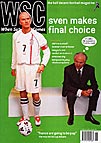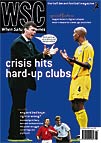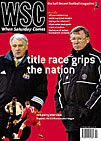 There's a World Cup coming up, apparently, so we invited three well-travelled journalists to make some rash predictions about what will happen. As a Swede based in London Marcus Christenson has ties to two of the countries in Group F. Gabriele Marcotti has lived in Japan and how tries to explain English football to Italians and vice-versa. Alan Duncan reports regularly on Nigeria and Cameroon, who face England and Ireland respectively, as well as the three other African qualifiers
There's a World Cup coming up, apparently, so we invited three well-travelled journalists to make some rash predictions about what will happen. As a Swede based in London Marcus Christenson has ties to two of the countries in Group F. Gabriele Marcotti has lived in Japan and how tries to explain English football to Italians and vice-versa. Alan Duncan reports regularly on Nigeria and Cameroon, who face England and Ireland respectively, as well as the three other African qualifiers
Are playing styles and tactics are becoming more homogeneous throughout the world, because most of the top players are playing in the same leagues? If so, does that make the World Cup less interesting?
Gabriele Marcotti There’s a greater uniformity. Not just in the way teams play, but also in how they train. If you look at the size of the Italian or Spanish players, they are now as big as the northern Europeans are expected to be. Everybody’s an athlete. Some of the English players still get drunk and irresponsible but the impression I get with players like Beckham and Owen is that they train seriously and take care of their diet. In some ways it has become more uniform, but in a positive way – the level of fitness has definitely increased everywhere.

